current location: 首页 Home News& Events News
Release time:2017-07-06 Number of visitors:
On 6 July 2017, the International Seminar on Performance Management in Higher Education Institutions and Public Hospitals was successfully held in the conference room on the first floor of Ruibin Building of Friendship Hotel. The international seminar was co-organised by the School of Public Administration and Policy of Renmin University of China and the Chinese Academy of Personnel Science, and co-organised by the Centre for Evidence-based Governance Research of Renmin University of China.
Performance management is becoming an important tool and instrument for governments to implement reforms in institutions and improve the quality of public services. This International Symposium on Performance Management in Higher Education Institutions and Public Hospitals aims to promote dialogue in four areas: dialogue between theory and practice, dialogue between international and national, dialogue between different disciplines and dialogue between different policy areas. The forum was opened by Professor Yang Kaifeng, Dean of the School of Public Administration and Policy of Renmin University of China.

Opening Ceremony
Address|Executive Deputy Secretary, Renmin University of China, Zhang Jianming
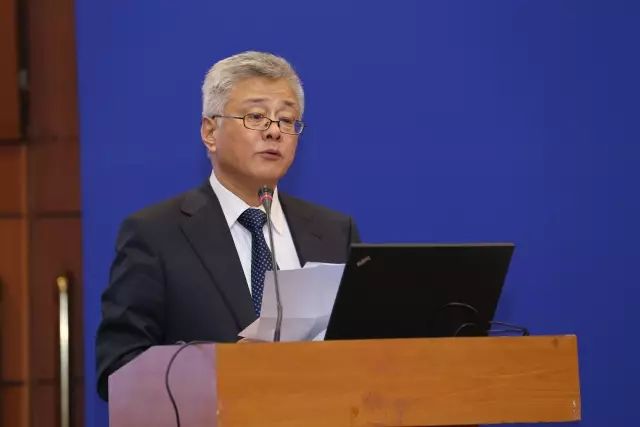
Zhang Jianming, Executive Deputy Secretary of Renmin University of China, began his speech. He expressed his gratitude to the School of Public Administration and the Chinese Academy of Personnel Science for their support and careful preparation, and wished the seminar a great success. Deputy Secretary Zhang said that today's high-level, high-level international symposium on performance management in higher education institutions and public hospitals is an active exploration and vivid practice in the field of humanities and social sciences to which we have always been committed. There are structural contradictions between the organisation of institutions and the market economy that are incompatible. As the two largest institutions in China, the reform paths of higher education institutions and public hospitals will influence the future reform direction of the country, and this is the greatest value of this seminar.
Address|President Yu Xing'an, China Academy of Personnel Science
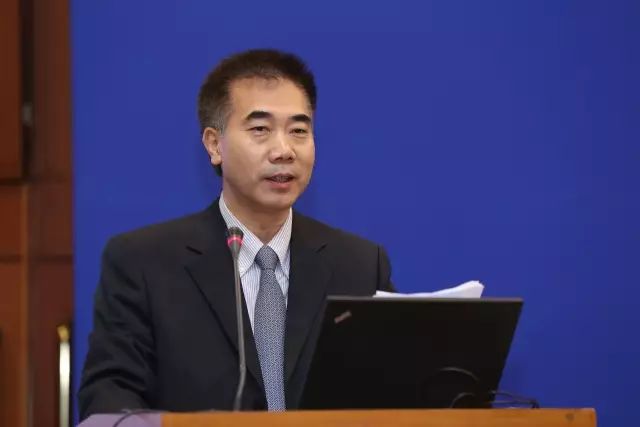
Dean Yu Xing'an of the Chinese Academy of Personnel Science then delivered a speech. President Yu Xing'an first welcomed the guests on behalf of one of the organisers, the Chinese Academy of Personnel Science. President Yu Xing'an then introduced our government's dual-class goal of building world-class universities and world-class disciplines, while depicting the blueprint for building a healthy China. In the face of the new development tasks, how to further improve the performance management system of universities and public hospitals, improve the incentive and restraint mechanism, and thus enhance the effectiveness of higher education and healthcare, requires scholars to clarify their understanding in theory and explore in practice in all aspects. Finally, President Yu Xing'an suggested that this seminar was a platform for information sharing and a good opportunity for idea exchange. He eagerly hoped that the participating experts could express their views freely and provide new ideas and thoughts for the establishment of scientific management systems for public hospitals and universities.
Address|Sun Yang, Director of the Medical Management Centre of the National Health and Family Planning Commission
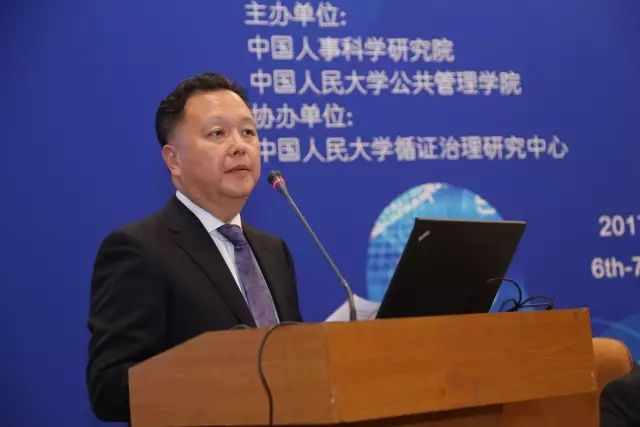
Then, Director Sun Yang of the Medical Management Centre of the National Health and Family Planning Commission delivered a speech. Director Sun Yang suggested that public hospitals are the mainstay of the healthcare service system and the main battleground for deepening the reform of the medical and health system. The Centre for Medical Administration is now responsible for establishing a performance appraisal mechanism oriented towards public welfare, and has been working to carry out performance appraisal through the adoption of big data and information technology, by establishing a visual information platform for performance appraisal, and striving to achieve paperless, collaborative, visual, automated and convenient performance appraisal and real-time. Director Sun Yang hoped to use this opportunity to communicate with scholars and to strongly promote the practice and research of performance management in higher education institutions and public hospitals through the four dialogues of this conference.
Greetings|Director Huang Baoyin, Academic Degrees and Postgraduate Education Development Centre, Ministry of Education
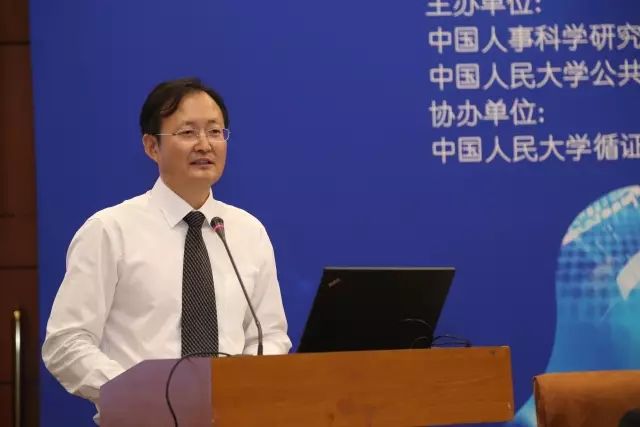
Thereafter, Director Huang Baoyin of the Development Centre for Degree and Postgraduate Education of the Ministry of Education delivered a speech. Director Huang Baoyin firstly introduced the overview of the Development Centre for Degree Management and Postgraduate Education of the Ministry of Education, which is an institution of the Ministry of Education and serves five main areas, namely the Ministry of Education, higher education institutes, local governments, our society and the international community. Thereafter, Director Huang Baoyin talked about his views on performance evaluation. He believed that performance evaluation needs to be strengthened in four aspects: firstly, highlighting Chinese characteristics; secondly, emphasizing talent-based; thirdly, realizing classification evaluation; and fourthly, actively fostering and strongly supporting third-party independent evaluation agencies.
Address|Theresa W. Gleton, President, National Academy of Administration, USA
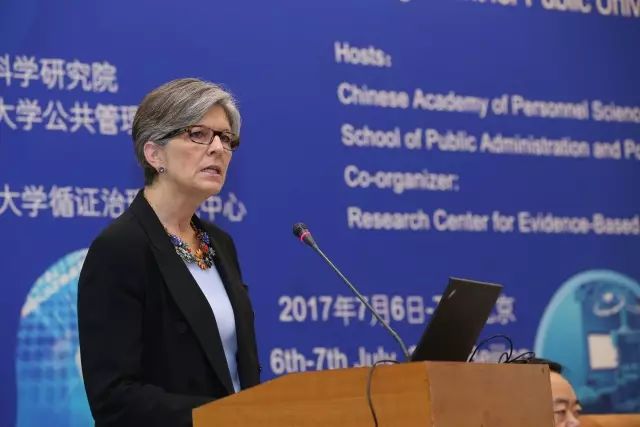
The final address was given by President Teresa W. Gerton of the National Academy of Administration. Theresa W. Gleton President Gerton began by expressing his great honour to be able to participate in this conference. He said that the topic of performance management in higher education and public hospitals is an important topic for China and an important topic for the United States. The current student debt, economic situation, and employment situation in the US have forced scholars to think about this topic and about the cost of healthcare and healthcare delivery in public hospitals. Performance management has a very important role to play in this and Teresa President Gleaton is keen to have a more in-depth conversation with you.
Keynote Addresses
Five keynote speeches followed, chaired by Yu Xing'an, President of the Chinese Academy of Personnel Science.
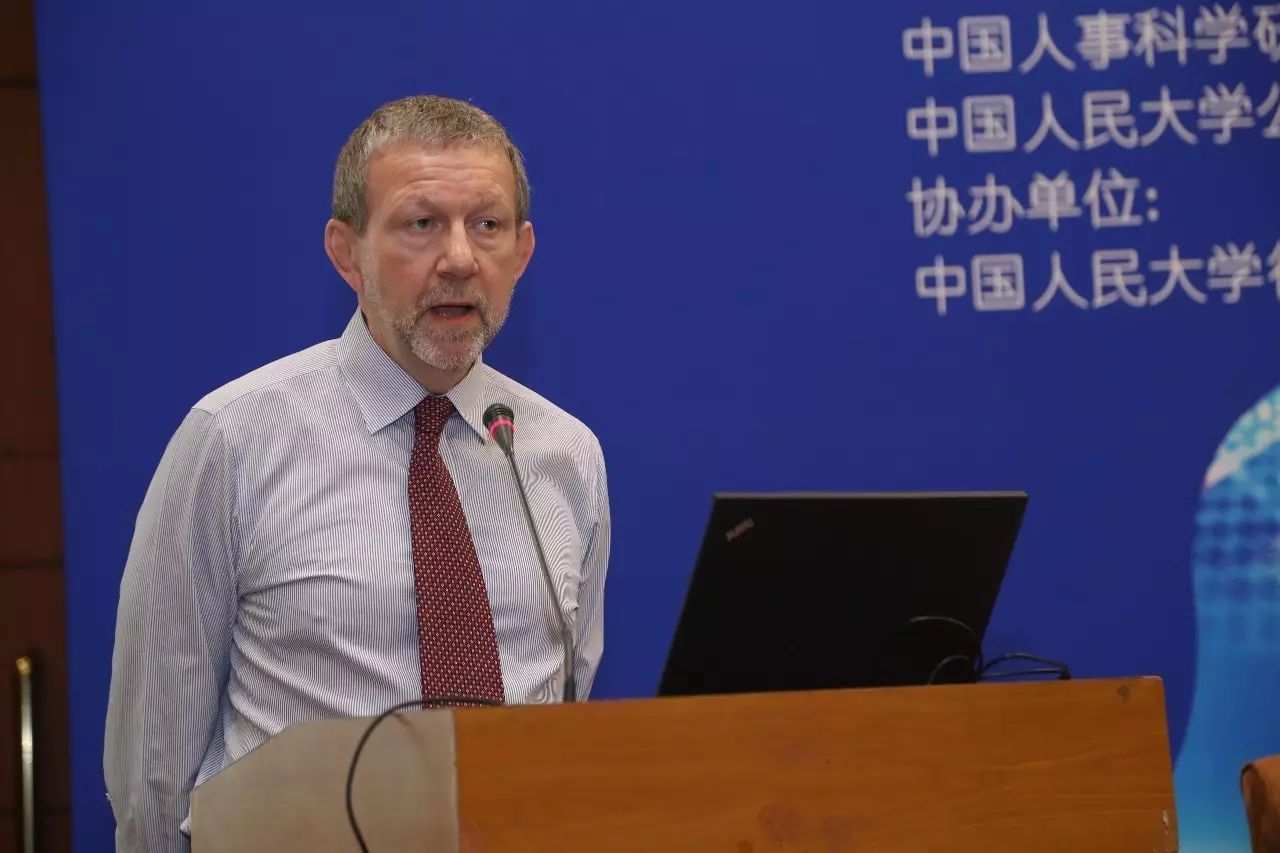
The first speaker was Paul Elliott, Deputy Chief Inspector of the UK Health Quality Inspectorate. He gave a presentation on the management and health system of hospitals in the UK and then compared the health systems between the two countries. In addition, he gave an introduction to the UK's health quality monitoring system and looked at the quality monitoring system in China. He concluded that the UK health system is still difficult to benchmark against international practice, but they are very credible and will thereafter improve further based on their own situation.
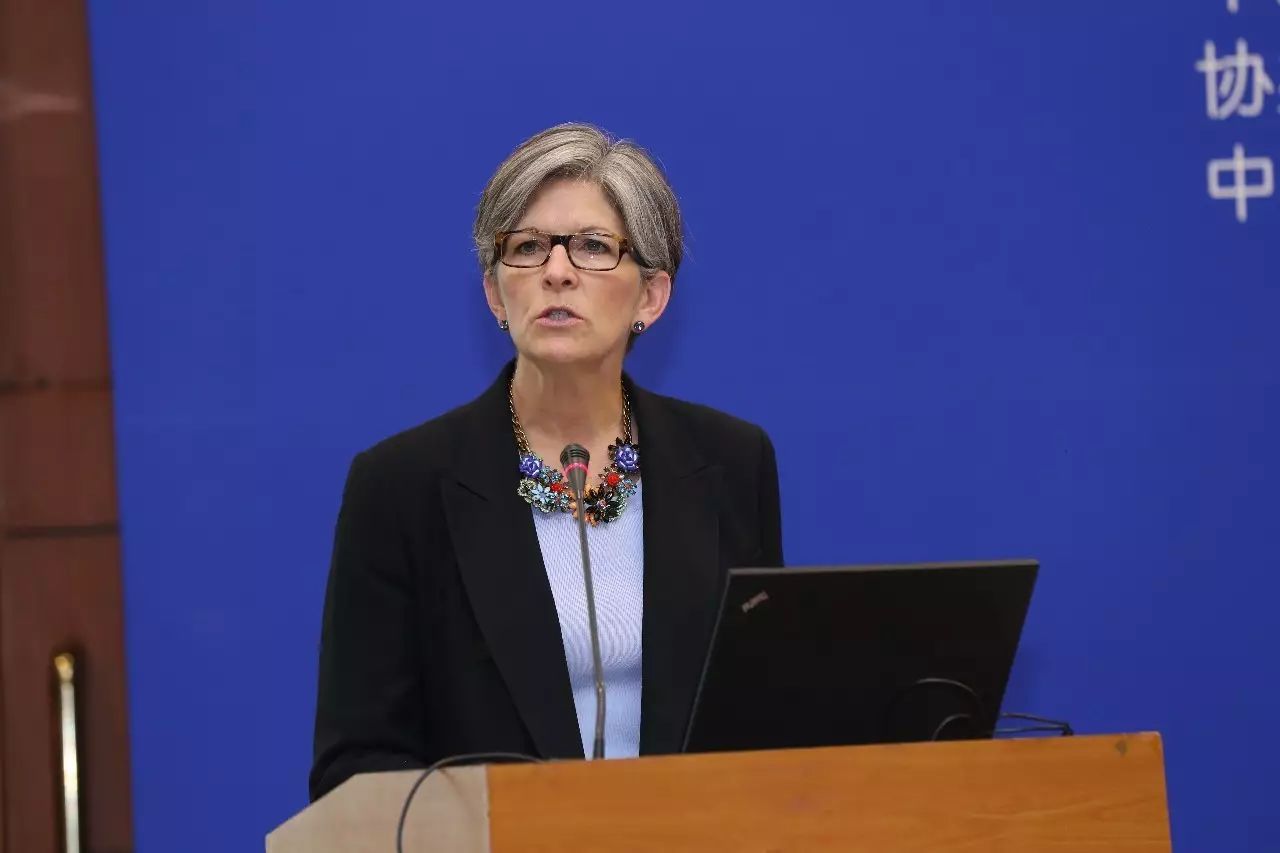
The second speaker was Teresa W. Gerton, President of the National Academy of Administration. She shared with the audience how they conduct public administration from the perspective of the National Academy of Administration. Congress provides the National Academy of Administration with the opportunity to conduct public administration in government, and the Academy's institutes include many members of Congress, governors and mayors, as well as many prominent scholars, entrepreneurs, and leaders in public administration. The purpose of the National Academy of Administration is to help leaders at all levels of government by providing them with policy advice, solutions to challenges, advice and technical support.
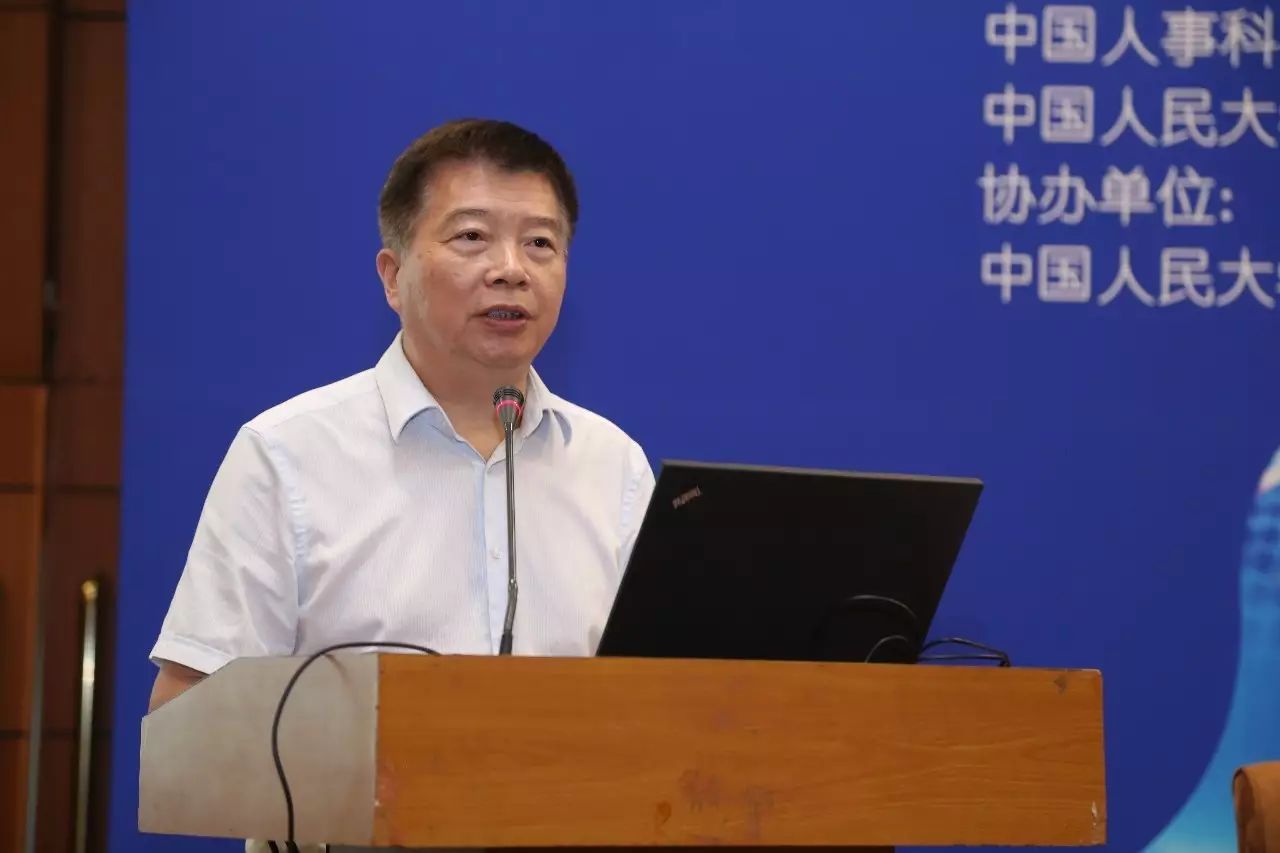
The third speaker was Gao Xiaoping, Vice President and Secretary General of the Chinese Academy of Administration and Management. He spoke on the topic of how to improve the performance of the translation of research results of think tanks. He detailed the five steps for the transformation of research results. The first step is to be problem-oriented, identifying among all scientific and technological results issues related to social problems and governance issues, and proposing topics of public management; the second step is to be policy issue-oriented, transforming basic research results involving public management topics into applied results, and transforming applied results into governance problems of realistic concern to the government. In the third step, the results of scientific research will be generalised, oriented to the functions of the government; in the fourth step, oriented to the modernisation of national governance, the public theses will be transformed into innovative propositions for policy-making and administrators around the relevant work of the government; in the final step, a final outcome text will also be formed, and the innovative propositions will be transformed into a discourse system and thematic text for administration, oriented to the discourse system with Chinese characteristics system.
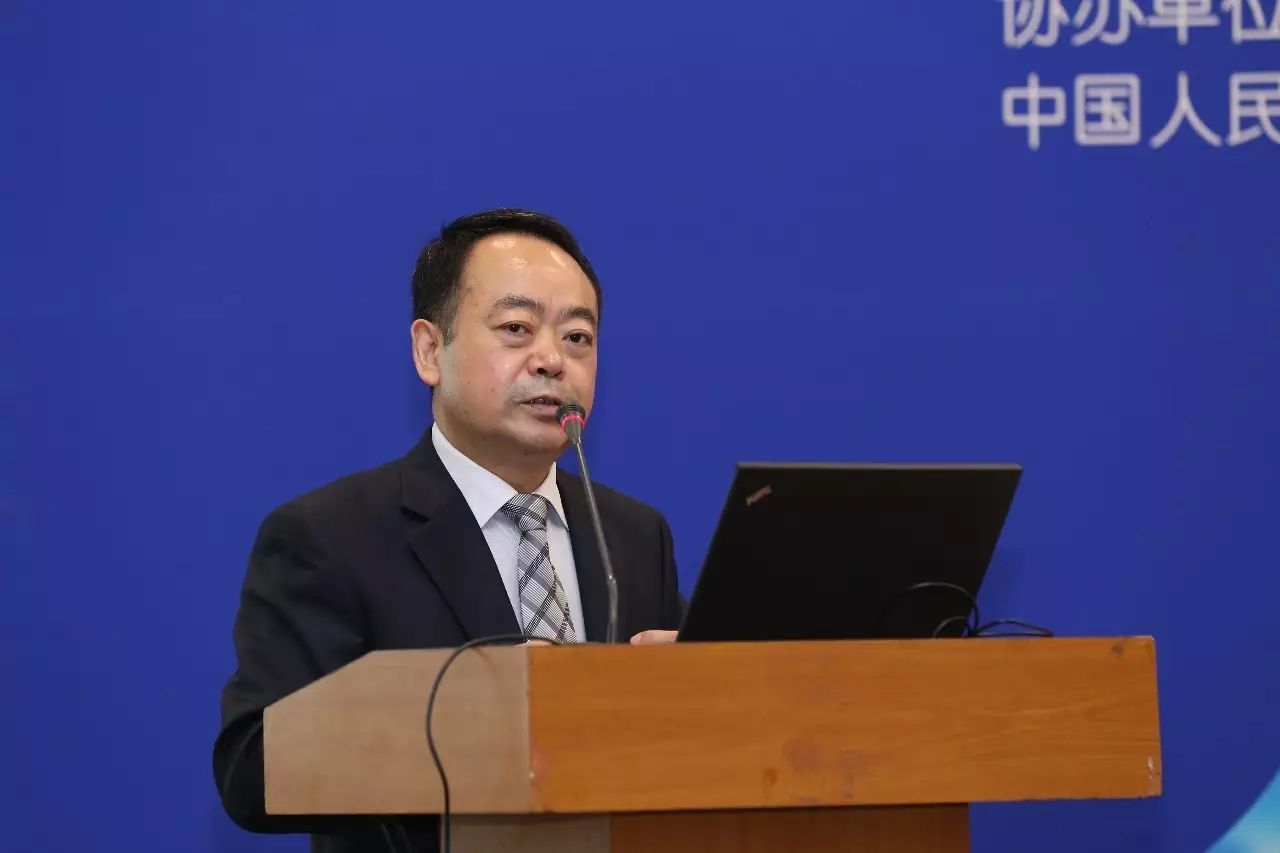
The fourth speaker was Wu Wenwu, Deputy Inspector of the Department of Personnel Management of Personnel Units of the Ministry of Human Resources and Social Security. He briefed the audience on the reform of personnel institutions. Firstly, he introduced the reform path of the personnel system of the institutions. Then, he introduced the legal system, which specifically included the basic initial purpose, starting point, management system and operation mechanism of personnel management in the institutions that emerged, as well as the three major systems of the regulations governing the personnel system, namely the employment system, the posting system and the management system. Finally, he talked about team building in institutions, where the three teams of managers, professionals and technicians, and skilled workers all have an important role to play in the development of public services.
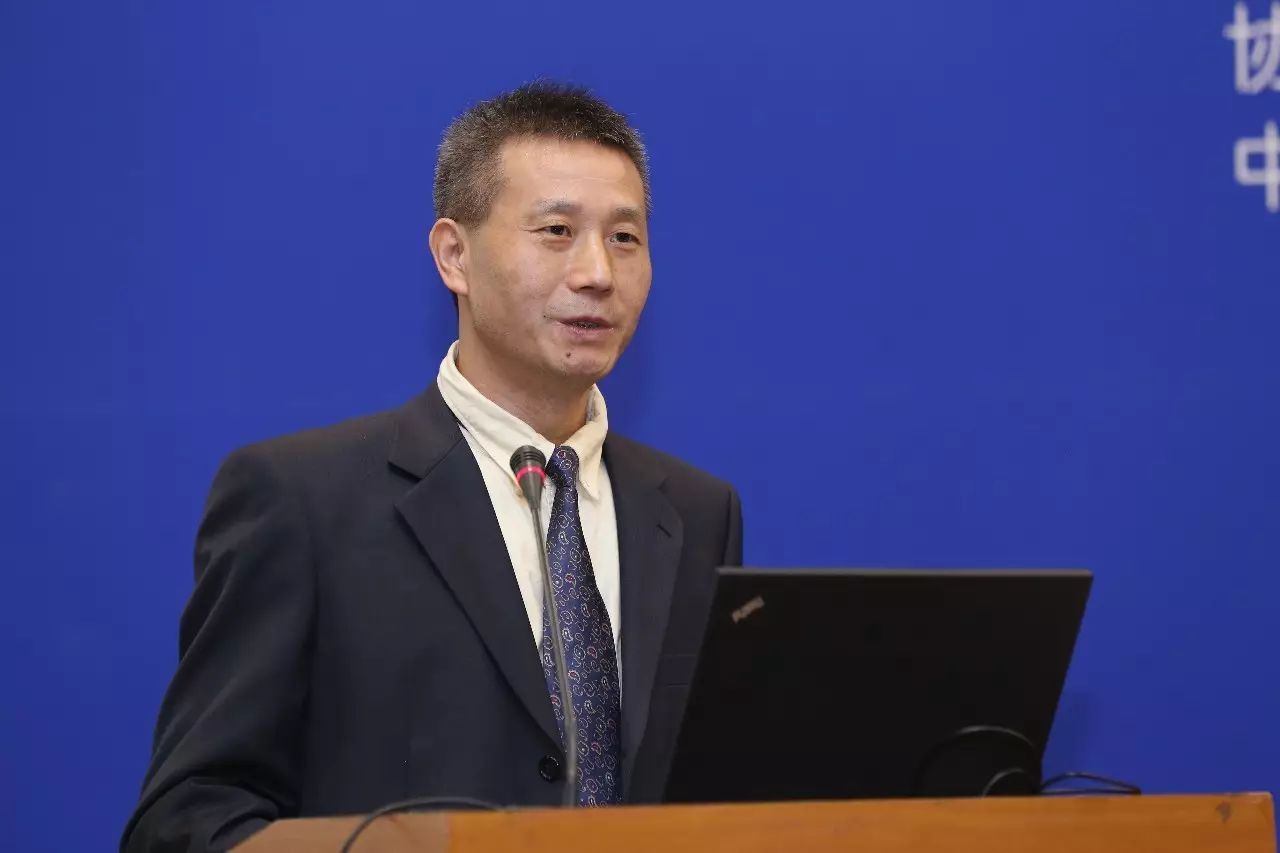
The last speaker was Li Jianzhong, Vice President of the Chinese Academy of Personnel Science. He focused on four main areas to share with the audience. The first aspect was what is the conceptual or performance culture perceptions reached by the public in forming the existing performance evaluation process for personnel in institutions and discussed the performance philosophy in China. The second area focused on performance evaluation methods in Chinese institutions. The third area is the challenges that may be faced by the performance appraisal models currently used. The fourth area is some reflections and suggestions on the direction of performance evaluation of personnel in institutions.
Parallel Roundtable SessionⅠ
In the afternoon of 6 July, two parallel roundtables were held in the conference room on the first floor of the Rui Bin Building of the Friendship Hotel. The theme of Parallel RoundtableⅠ was Performance Management in Public Hospitals and was chaired by Wang Dan, Executive Director of the Hospital Management Research Centre of Renmin University of China.
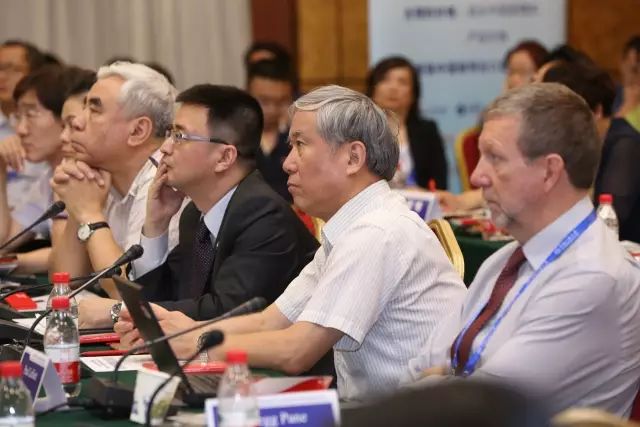
In Parallel Roundtable I, Gray Penn, Senior Director of the Bureau of Health Care Affairs at the American Association of Medical Colleges (AAMC) and a member of NAPA, spoke to the audience about how health care in the US integrates payment and performance evaluation. ZhaiXiaohui, Director of the National Health and Family Planning Commission's Centre for Medical Management, discussed what the main elements of health system appraisal should be. Chen Zhaoyun, Director of the Institute of Hospital Management of the National Health and Family Planning Commission, considers the conflict and synergy of multi-dimensional performance objectives as one of the key issues in the performance management of our national public hospitals. Lv Yiping, Deputy Director of the Beijing Municipal Hospital Administration, explores the problems that arise in appraisal. Zhou Zijun, Editor-in-Chief of Hospital Management Forum, Professor of School of Public Health, Peking University, introduced the challenges facing public hospital reform and performance management in Beijing. Xin Youqing, Secretary of the Party Committee and Chairman of the Board of Directors of Beijing Friendship Hospital, put a fine point on performance management. Wang Hufeng, Professor at the Centre for Medical Reform Studies, Renmin University of China, discussed the issue of performance reform in public hospitals from a metaphysical perspective. Tong Zhaohui, Vice President of Beijing Chaoyang Hospital, discussed how hospital performance indicators and allocation schemes should be adjusted in the context of the comprehensive reform of the separation of medicine. Zhou Jianxin, Vice President of Beijing Tiantan Hospital, proposed how to use information technology to promote hospital performance management. Wu Jianxin, Deputy Director of the Capital Institute of Paediatrics, proposed how to use performance appraisal to promote financial management. Xing Mo, Vice President of Beijing Cancer Hospital, introduced in detail the performance management and practice of Beijing Cancer Hospital for departments. XiongTongcheng, Deputy Director of the Chinese Academy of Personnel Science, introduced how to make institutional performance appraisal a powerful tool for promoting public welfare in public hospitals.
Parallel Roundtable Session II
The theme of Parallel Roundtable II was Performance Management in Higher Education Institutions and was chaired by Liu Xuezhi, Vice President of the Chinese Academy of Personnel Science.
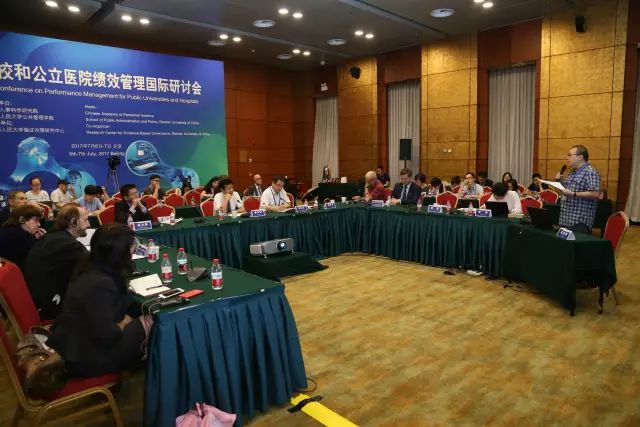
In parallel Round Table II, EydunDigrud Berg, a senior official at the Norwegian Ministry of Education and Research's Directorate of Higher Education, gave a detailed presentation on the Norwegian higher education funding system, as well as the aims and current structure of the reform of the Norwegian higher education system. Aaron Cohen, Professor at the School of Political Science, University of Haifa, Israel, presented what academic performance is, how it is assessed in Israel, and what are the problems in assessing academic performance. Lin Mengquan, Director of the Assessment Division of the Development Centre for Academic Degrees and Postgraduate Education of the Ministry of Education, shared with the audience the relationship between discipline assessment and performance management in universities. Liu Xiangbing, Director of the China Institute of Labour Relations, introduced a very important aspect of performance management, namely how strategy can be effective in the process of promotion. Demetra Nightingale, Senior Fellow of the Urban Institute and a member of the National Academy of Administration, introduced performance assessment policies based on current political corroboration and how they are applied to higher education in the US. Yang Jie, Director of Planning and Development at Shanghai Jiao Tong University, firstly made some comments on the problems in performance management in Chinese universities, and then introduced the exploration and response of Shanghai Jiao Tong University in these areas. Zhang Min, Deputy Director of the Office of Legal and Performance Research at the Chinese Academy of Personnel Science, argued that although performance management in Chinese higher education has gone through many spiralling stages of development, it is, on the whole, remarkably effective.
Paper presentation
On the morning of 7 July, the paper presentation session was held at the Qiushi Building of Renmin University of China. There were two sub-forums in the session, Sub-forum A on "Performance Management in Public Hospitals" and Sub-forum B on "Performance Management in Higher Education Institutions".
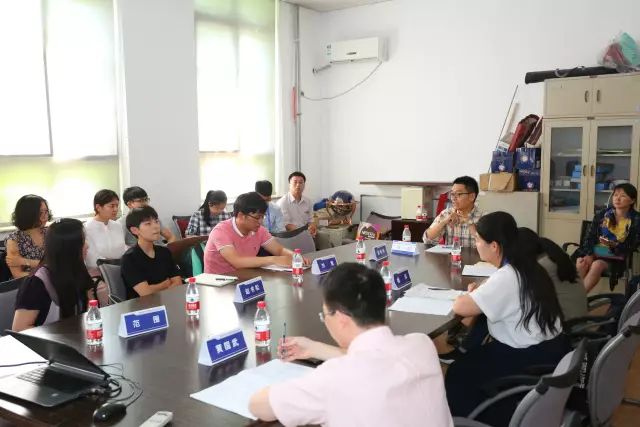
Sub-forum A, "Performance Management in Public Hospitals", consisted of three thematic forums with a total of 15 papers. Sub-forum A1, entitled "Latest Developments in Performance Management", was chaired by Zhang Shuhai, a lecturer at the School of Public Administration, Renmin University of China. The papers discussed topics such as political awareness in performance appraisal, staff reduction and efficiency, big data, financial management and technological innovation. Sub-forum A2, entitled "Performance Management in Hospitals in Different Regions", was chaired by Ma Liang, Associate Professor at the School of Public Administration, Renmin University of China, and featured papers on different types of hospitals, including county-level public hospitals, medical services in frontier regions, and urban public hospitals. Sub-forum A3, entitled "International Comparison of Hospital Performance Management", was chaired by Cao Qi, a lecturer at the School of Public Administration, Renmin University of China. The papers in this forum compared China's hospital performance with international standards from the perspectives of international comparison of performance appraisal in China's public hospitals, inspiration of performance management in foreign hospitals, and changes in performance appraisal.
Sub-forum B, "Performance Management in Higher Education Institutions", consisted of two sessions with nine papers in total. The theme of Sub-forum B1 is "New Developments in Performance Management in Universities", chaired by Ma Liang, Associate Professor of School of Public Administration, Renmin University of China. The theme of Sub-forum B2 was "Performance System Optimization in University Functions". The topic of Sub-forum B2 was "Performance Management of Internal Departments in Universities", chaired by Ouyang Wei, Lecturer of School of Public Administration, Renmin University of China. The papers of the forum covered big data, ANT translation, DEA model and other perspectives, and discussed the practice of performance management of internal departments in universities in depth.
Conclusion of the conference
At the end of the conference, Liu Ying, Associate Professor at the School of Public Administration and Policy, Renmin University of China, delivered a speech, expressing his heartfelt thanks to all the guests, teachers and students who had come from all over the world to attend the conference, and to the conference organisers and staff who had organised and hosted the conference, and expressing his sincere hope that all scholars would gain much from this forum.